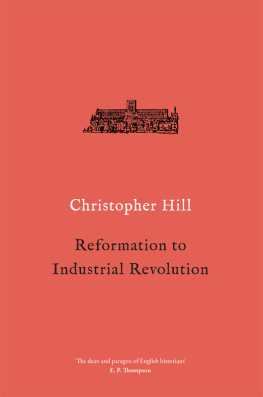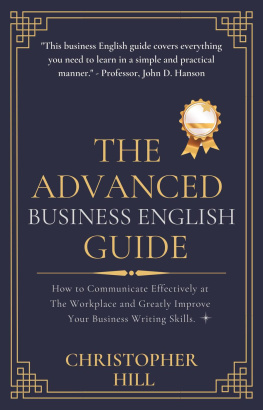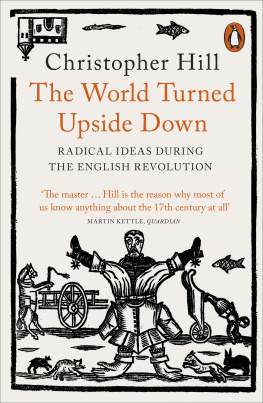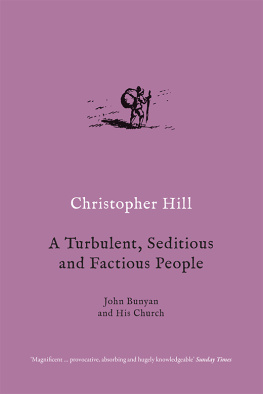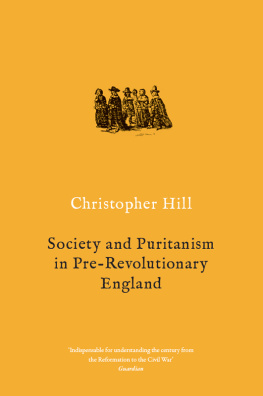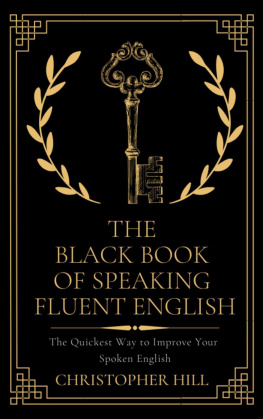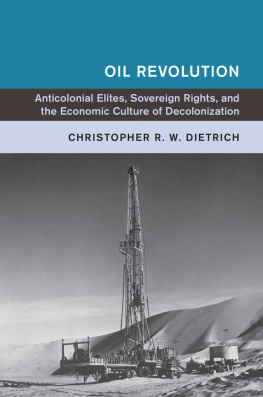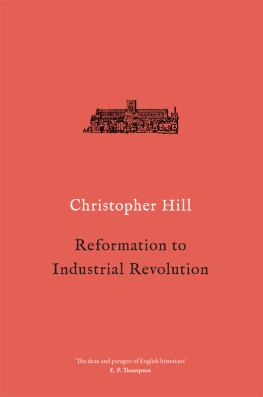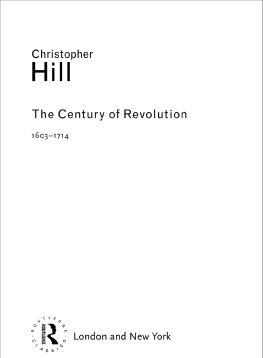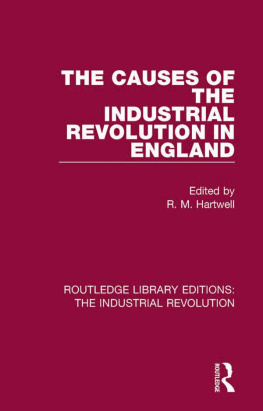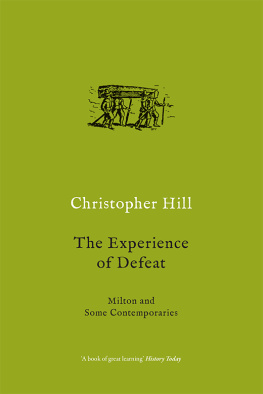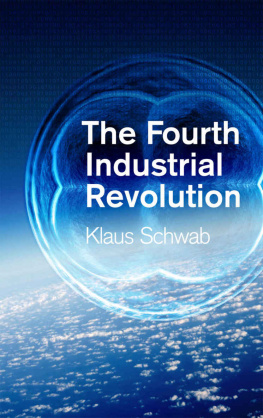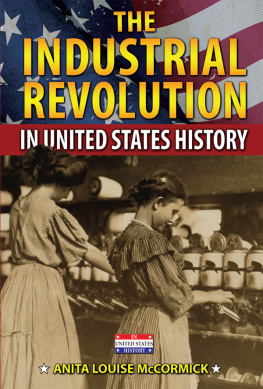Christopher Hill - Reformation to Industrial Revolution
Here you can read online Christopher Hill - Reformation to Industrial Revolution full text of the book (entire story) in english for free. Download pdf and epub, get meaning, cover and reviews about this ebook. year: 2018, publisher: Verso, genre: Religion. Description of the work, (preface) as well as reviews are available. Best literature library LitArk.com created for fans of good reading and offers a wide selection of genres:
Romance novel
Science fiction
Adventure
Detective
Science
History
Home and family
Prose
Art
Politics
Computer
Non-fiction
Religion
Business
Children
Humor
Choose a favorite category and find really read worthwhile books. Enjoy immersion in the world of imagination, feel the emotions of the characters or learn something new for yourself, make an fascinating discovery.
- Book:Reformation to Industrial Revolution
- Author:
- Publisher:Verso
- Genre:
- Year:2018
- Rating:3 / 5
- Favourites:Add to favourites
- Your mark:
- 60
- 1
- 2
- 3
- 4
- 5
Reformation to Industrial Revolution: summary, description and annotation
We offer to read an annotation, description, summary or preface (depends on what the author of the book "Reformation to Industrial Revolution" wrote himself). If you haven't found the necessary information about the book — write in the comments, we will try to find it.
Reformation to Industrial Revolution — read online for free the complete book (whole text) full work
Below is the text of the book, divided by pages. System saving the place of the last page read, allows you to conveniently read the book "Reformation to Industrial Revolution" online for free, without having to search again every time where you left off. Put a bookmark, and you can go to the page where you finished reading at any time.
Font size:
Interval:
Bookmark:

Industrial Revolution
15301780
Industrial Revolution
15301780
Christopher Hill

For Vivian Galbraith
WITH THE ACCUMULATED GRATITUDE
OF THIRTY-SEVEN YEARS
This paperback edition first published by Verso 2018
First published by Weidenfeld & Nicolson 1967
Published with revisions by Pelican Books 1969
Christopher Hill 1967, 1969, 2018
All rights reserved
The moral rights of the author have been asserted
1 3 5 7 9 10 8 6 4 2
Verso
UK: 6 Meard Street, London W1F 0EG
US: 20 Jay Street, Suite 1010, Brooklyn, NY 11201
versobooks.com
Verso is the imprint of New Left Books
ISBN-13: 978-1-78663-618-8
ISBN-13: 978-1-78663-619-5 (US EBK)
ISBN-13: 978-1-78663-620-1 (UK EBK)
British Library Cataloguing in Publication Data
A catalogue record for this book is available from the British Library
Library of Congress Cataloging-in-Publication Data
A catalog record for this book is available from the Library of Congress
Printed and bound by CPI Group (UK) Ltd, Croydon, CR0 YY
PART ONE
INTRODUCTION
PART TWO
FROM REFORMATION TO REVOLUTION
PART THREE
THE REVOLUTION
PART FOUR
FROM POLITICAL TO INDUSTRIAL REVOLUTION
SOME of the subjects discussed in this book have already been treated in my Century of Revolution, 16031714 (Vol. 5 of the Nelson History of England, 1961). Where possible I have used different illustrative material. Spelling and punctuation have been modernized in all quotations. The Index may help readers to identify persons referred to briefly in the text. Where a footnote refers to a book by the authors name only, or authors name and a date, the full title will be found in the Bibliography on Dr Eric Hobsbawm very kindly read part of the typescript, and Mr Edward Thompson the whole of it; both made many useful suggestions. Mr Paul Slack undertook the dreary task of reading the proofs and saved me from many mistakes. None of these, however, is to blame for the errors which remain. Nor is my wife, who read it all and helped at every stage in every way.
CHRISTOPHER HILL
I am very grateful to Miss Penelope Corfield, Professor G. R. Elton, Professor F. J. Fisher, Mr S. Inwood and Mr W. E. Makin for pointing out misprints, errors and misleading statements, most of which have been corrected.
C.H.
I have made some revisions for this edition, arising especially from two important books published during 1967 Dr Patrick Collinsons The Elizabethan Puritan Movement, and Volume IV of The Agrarian History of England and Wales, 15001640, edited by Dr Joan Thirsk. I am grateful to Dr Thirsk and Dr Alan Macfarlane for help in revising, though the responsibility for what has emerged is my own.
C.H.
This is the reward I look for, that my labours may but receive an allowance suspended until such time as this description of mine be reproved by a better. SIR WALTER RALEGH, History of the World (1614)
I HAVE tried in this book to isolate and explain some of those features which differentiate English history from that of the rest of Europe in the years between 1530 and 1780. Movements of population and prices were roughly similar all over Europe during this period; but the Netherlands and England were unique in having successful political revolutions which led to greater commercial influence over governments; England was unique in her Industrial Revolution at the end of our quarter of a millennium. The sixteenth-century price revolution was accompanied by industrial decline in Spain, industrial advance in England. Some historians have explained the lowered living standards of the sixteenth-century English peasantry solely by rising population; but in fifteenth-century Czechoslovakia a fall in peasant standards of living accompanied a declining population. Rising population contributed to industrial revolution in eighteenth-century England; it probably increased poverty in Ireland, China and elsewhere. Since a great deal of arable land in Britain was still uncultivated in the eighteenth century, we might well ask, Why did the increasing population not lead to an extension of peasant farming?
Nor can we attribute political crisis to demographic or monetary changes. The years 15301620 in England saw an inflation and what some historians refer to as a population explosion: they were years of relative social and political stability. The ensuing half century of political crisis was one in which inflation tailed off and the population increase is believed to have slowed down. In the eighteenth century, when institutions and social The connexion between economics and politics is not simple.
Social history is therefore, in my view, not what G. M. Trevelyan called it, the history of a people with the politics left out. Politics affected the social structure and so the economic and social life of the people. In this book I have stressed the significance of the seventeenth-century political revolution in transforming English social and economic life, in making possible what historians are beginning to recognize as the agricultural and commercial revolutions of the seventeenth century,in the eighteenth century, which was cause and effect of his economic decline, and contrast it with the sober independence of his prospering West Riding counterpart, we may well wonder whether the catastrophic defeat of Monmouths rebellion in the West in 1685, the last kick of the Good Old Cause, may not have had something to do with it.
One way of appreciating the impact of politics on economic development is to ask whether the course of English history could have been different. Such a question is worth asking now that we can see western imperialism as a brief interlude in human history. Suppose the little England of the early years of Elizabeth had continued; suppose the outcome of the English Revolution had been a victory for the radicals who so nearly captured control of the army in 164749; that in consequence the proletarianization of small masters in industry, the disappearance of the yeomanry, had been very much slowed down; that Leveller opposition to the conquest of Ireland had prevailed in 1649; suppose the author of Tyranipocrit (also published in 1649) had persuaded his fellow-countrymen that it was wrong for merchants to rob the poor Indians, to make slaves, or for governments of the rich to use the poor to fight their battles for them. Suppose there had been no Navigation Acts, no powerful navy, no colonial monopoly empire, no commercial revolution. Dutch merchants would have continued to carry our trade, capital accumulation would have been far slower, there would have been no industrial revolution in England in advance of the rest of the world. The worker who in 1530 could earn his yearly bread by fourteenfifteen weeks labour might not have had to work fifty-two weeks to earn the same amount two centuries later.
But let us not sentimentally conclude that all would have been gain if England had pursued the relatively peaceful path of a Denmark, or Switzerland, and had not become a world power. Miltons poetry, Newtons astronomy, Lockes philosophy, Watts steam engine, Adam Smiths economics all these would no doubt disappear too if we wished out of existence the relationship of social forces which made the English revolution go the way it did. The long-term factors which in England fostered economic growth also brought about the seventeenth-century We cannot change one variable without affecting all the others. That, in fact, seems to me the ultimate lesson to be learnt from history: that fair is foul and foul is fair. Perhaps this is that doom which Adam fell into of knowing good and evil, that is to say of knowing good by evil. History, as Engels once said, is about the most cruel of all goddesses, who drives her triumphal chariot over heaps of the slain.
Font size:
Interval:
Bookmark:
Similar books «Reformation to Industrial Revolution»
Look at similar books to Reformation to Industrial Revolution. We have selected literature similar in name and meaning in the hope of providing readers with more options to find new, interesting, not yet read works.
Discussion, reviews of the book Reformation to Industrial Revolution and just readers' own opinions. Leave your comments, write what you think about the work, its meaning or the main characters. Specify what exactly you liked and what you didn't like, and why you think so.

